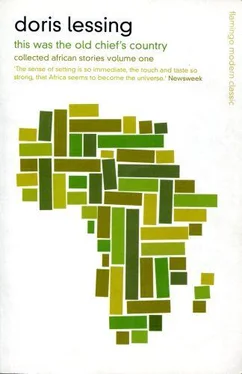The point was that it was meaningless. I was not ten miles from home: I had only to take my way back along the valley to find myself at the fence; away among the foothills of the kopjes gleamed the roof of a neighbour's house, and a couple of hours walking would reach it. This was the sort of fear that contracts the flesh of a dog at night and sets him howling at the full moon. It had nothing to do with what I thought or felt; and I was more disturbed by the fact that I could become its victim than of the physical sensation itself: I walked steadily on, quietened, in a divided mind, watching my own pricking nerves and apprehensive glances from side to side with a disgusted amusement. Deliberately I set myself to think of this village I was seeking, and what I should do when I entered it — if I could find it, which was doubtful, since I was walking aimlessly and it might be anywhere in the hundreds of thousands of acres of bush that stretched about me. With my mind on that village, I realized that a new sensation was added to the fear: loneliness. Now such a terror of isolation invaded me that I could hardly walk; and if it were not that I came over the crest of a small rise and saw a village below me, I should have turned and gone home. It was a cluster of thatched huts in a clearing among trees. There were neat patches of mealies and pumpkins and millet, and cattle grazed under some trees at a distance. Fowls scratched among the huts, dogs lay sleeping on the grass, and goats friezed a kopje that jutted up beyond a tributary of the river lying like an enclosing arm round the village.
As I came close I saw the huts were lovingly decorated with patterns of yellow and red and ochre mud on the walls; and the thatch was tied in place with plaits of straw.
This was not at all like our farm compound, a dirty and neglected place, a temporary home for migrants who had no roots in it.
And now I did not know what to do next. I called a small black boy, who was sitting on a log playing a stringed gourd, quite naked except for the strings of blue beads round his neck, and said: Tell the Chief I am here.' The child stuck his thumb in his mouth and stared shyly back at me.
For minutes I shifted my feet on the edge of what seemed a deserted village, till at last the child scuttled off, and then some women came. They were draped in bright cloths, with brass glinting in their ears and on their arms. They also stared, silently: then turned to chatter among themselves.
I said again: 'Can I see Chief Mshlanga?' I saw they caught the name; they did not understand what I wanted. I did not understand myself.
At last I walked through them and came past the huts and saw a clearing under a big shady tree, where a dozen old men sat cross-legged on the ground, talking. Chief Mshlanga was leaning back against the tree, holding a gourd in his hand, from which he had been drinking. When he saw me, not a muscle of his face moved, and I could see he was not pleased: perhaps he was afflicted with my own shyness, due to being unable to find the right forms of courtesy for the occasion. To meet me, on our own farm, was one thing; but I should not have come here. What had I expected? I could not join them socially: the thing was unheard of. Bad enough that I, a white girl, should be walking the veld alone as a white man might: and in this part of the bush where only Government officials had the right to move.
Again I stood, smiling foolishly, while behind me stood the groups of brightly-clad, chattering women, their faces alert with curiosity and interest, and in front of me sat the old men, with old lined faces, their eyes guarded, aloof. It was a village of ancients and children and women. Even the two young men who kneeled beside the Chief were not those I had seen with him previously: the young men were all away working on the white men's farms and mines, and the Chief must depend on relatives who were temporarily on holiday for his attendants.
'The small white Nkosikaas is far from home,' remarked the old man at last.
'Yes,' I agreed, 'it is far.' I wanted to say: 'I have come to pay you a friendly visit, Chief Mshlanga.' I could not say it. I might now be feeling an urgent helpless desire to get to know these men and women as people, to be accepted by them as a friend, but the truth was I had set out in a spirit of curiosity: I had wanted to see the village that one day our cook; the reserved and obedient young man who got drunk on Sundays, would one day rule over.
'The child of Nkosi Jordan is welcome,' said Chief Mshlanga.
'Thank you,' I said, and could think of nothing more to say. There was a silence, while the flies rose and began to buzz around my head; and the wind shook a little in the thick green tree that spread its branches over the old men.
'Good morning,' I said at last. 'I have to return now to my home.'
"Morning, little Nkosikaas,' said Chief Mshlanga.
I walked away from the indifferent village, over the rise past the staring amber-eyed goats, down through the tall stately trees into the great rich green valley where the river meandered and the pigeons cooed tales of plenty and the woodpecker tapped softly.
The fear had gone; the loneliness had set into stiff-necked stoicism; there was now a queer hostility in the landscape, a cold, hard, sullen indomitability that walked with me, as strong as a wall, as intangible as smoke; it seemed to say to me: you walk here as a destroyer. I went slowly homewards, with an empty heart: I had learned that if one cannot call a country to heel like a dog, neither can one dismiss the past with a smile in an easy gush of feeling, saying: I could not help it, I am also a victim.
I only saw Chief Mshlanga once again.
One night my father's big red land was trampled down by small sharp hooves, and it was discovered that the culprits were goats from Chief Mshlanga's kraal. This had happened once before, years ago.
My father confiscated all the goats. Then he sent a message to the old Chief that if he wanted them he would have to pay for the damage.
He arrived at our house at the time of sunset one evening, looking very old and bent now, walking stiffly under his regally- draped blanket, leaning on a big stick. My father sat himself down in his big chair below the steps of the house; the old man squatted carefully on the ground before him, flanked by his two young men.
The palaver was long and painful, because of the bad English of the young man who interpreted, and because my father could not speak dialect, but only kitchen kaffir.
From my father's point of view, at least two hundred pounds' worth of damage had been done to the crop. He knew he could get the money from the old man. He felt he was entitled to keep the goats. As for the old Chief, he kept repeating angrily: 'Twenty goats! My people cannot lose twenty goats! We are not rich, like the Nkosi Jordan, to lose twenty goats at once.'
My father did not think of himself as rich, but rather as very poor. He spoke quickly and angrily in return, saying that the damage done meant a great deal to him, and that he was entitled to the goats.
At last it grew so heated that the cook, the Chief's son, was called from the kitchen to be interpreter, and now my father spoke fluently in English, and our cook translated rapidly so that the old man could understand how very angry my father was. The young man spoke without emotion, in a mechanical way, his eyes lowered, but showing how he felt his position by a hostile uncomfortable set of the shoulders.
It was now in the late sunset, the sky a welter of colours, the birds singing their last songs, and the cattle, lowing peacefully, moving past us towards their sheds for the night. It was the hour when Africa is most beautiful; and here was this pathetic, ugly scene, doing no one any good.
At last my father stated Anally: 'I'm not going to argue about it. I am keeping the goats.'
Читать дальше
Конец ознакомительного отрывка
Купить книгу












